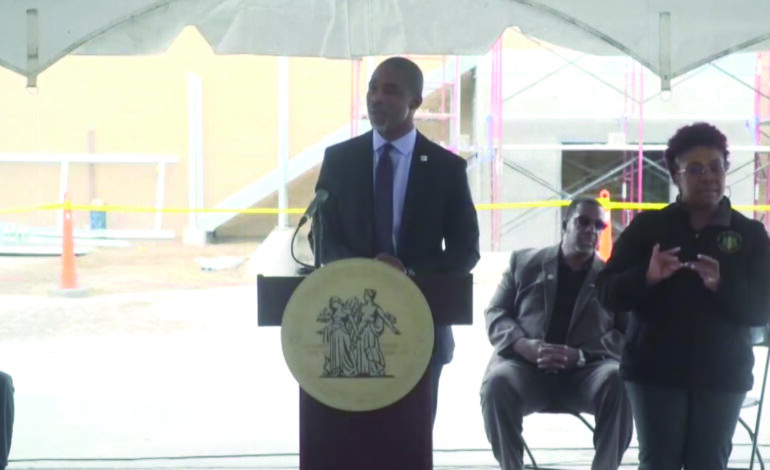DETROIT — The Detroit Wayne Integrated Health Network (DWIHN) has announced a comprehensive plan to ameliorate the treatment care capacity for behavioral health in Metro Detroit. The DWIHN has sought the state’s assistance to invest $227 million in both crisis care and residential housing.
This investment would address the mental health challenges prevalent within Metro Detroit and allow the DWIHN to provide quality care to those who need it. In order to properly and aptly treat residents, the DWIHN said they know improvements need to be made in the infrastructure and capacity of their mental health expanse.
On Wednesday April 26, Wayne County Executive Warren C. Evans and Detroit Mayor Mike Duggan joined DWIHN President and CEO Eric Doeh and other state health representatives to discuss and tackle the gaps that exist among mental and behavioral health services for Metro Detroit residents.
This plan includes expanding the space and capacity for inpatient housing for both short-term and long-term stays by adding a supplemental 450 beds in a newly established Crisis Care Center and specialized holistic and integrated resource center.
“Creating more opportunities for our region’s most vulnerable persons by including step-down approaches to long-term care, expanded residential services and the ability to offer behavioral health interventions for families are critical, and the time to act is now,” said DWIHN President and CEO Eric Doeh.
The DWIHN is Michigan’s largest community mental health organization and this plan would expand their behavioral healthcare services even further. They plan to develop an entirely amalgamated crisis care system that would equip them with the necessary tools to serve their residents to their best abilities.
This newly established framework will provide help for individuals with mental illness, development disabilities and substance abuse disorders and children who experience emotional disturbances, according to the DWIHN. This plan will ultimately provide residents with improved access to care that is focused on recovery, “through a person-centered and trauma informed model of healthcare service delivery.”

Detroit Wayne Integrated Health Network logo
Photo: DWIHN Facebook
The DWIHN shared that they want to improve and increase the mental and behavioral health resources throughout the Metro Detroit region, and in doing so they are currently working with the Wayne County Executive’s Office, the city of Detroit Mayor’s Office and an alliance of stakeholders to bring their plan to life.
The plan also expands to emergency service personnel by administering crisis intervention training to first responders. This supplies those first responders with tools such as crisis management, de-escalation abilities and implementing preliminary assessments of individuals that may need psychological intervention. The goal, according to the DWIHN, is to provide emergency service personnel with those skills to prevent unnecessary arrests and imprisonment of those who are suffering from a mental illness.
“DWHN’s plan to rebuild mental health treatment capacity for our most vulnerable residents will fill the gaps in mental healthcare system that have existed for decades now,” Duggan said. “Providing this added capacity will save lives by helping to prevent individuals experiencing a mental health crisis from causing harm to themselves or others, or just getting caught up in a criminal justice system that is not equipped to meet their needs. We have the data to demonstrate the need for these additional beds and support DWIHN’s efforts in working with the state to secure the funding needed to support them.”
The DWIHN shared that individuals with serious mental health issues are currently on a waitlist for in-patient treatment.
“Law enforcement is often the first to engage with untreated individuals when families become overwhelmed with what to do with their loved ones. As a result, too often our emergency departments and jails are the first stop for persons experiencing a behavioral health crisis.”
“It’s no secret that I’ve spent more than half of my life in law enforcement,” Evans said. “I’ve seen cases where mental health was a factor. Since 1992, when Governor Engler stopped state funding to the Lafayette Clinic, we’ve searched for ways to treat and care for those with severe mental illnesses who find themselves in the criminal justice system. These individuals do not need jails, they need resources, trained professionals and a safe place where they can receive treatment. That’s why I’m proud to stand alongside DWIHN on the initiative to Expand Mental Health Treatment Capacity. This will not only serve the residents of Wayne County, but it’ll expand our ability to truly impact an overwhelmed system.”
Information below provided by the DWIHN:
Issue: Current behavioral healthcare revolving door
Frequent and repeated users of emergency services with serious mental illnesses (SMIs) become a part of the mental health system’s “revolving door” in which SMI patients cycle through the emergency care and justice systems due to insufficient or unavailable treatment options.
The city of Detroit has identified 1,481 individuals stuck in this cycle who have repeatedly interfaced with these systems. As such, this population accounted for more than 21,000 calls for emergency service between 2020-2022, attributing to more than half of all mental health calls for service in Detroit during this time.
Of interest (1,481 individuals):
• 214 (29 percent) had three or more pre-admission crisis screenings, accounting for:
o 1,730 screenings
o 58 crisis residential admissions
• 177 (12 percent) had three or more pre-admission crisis screenings and three or more inpatient admissions, accounting for:
o 1,235 inpatient admissions
• 361 (24 percent) had three or more calls for service for emergency medical services (EMS) with an average of 11 EMS
runs per person
• 132 (9 percent) had at least one booking in Wayne County Jail, 19 had three or more bookings
Solution:
A comprehensive four-point plan to address long and short-term treatment capacity:
1. Crisis Care Center: +60 beds Short Term
2. In-patient psychiatric care: +160 beds Long Term
3. Specialized residential housing: +120 beds Long Term
4. Integrated residential housing: +110 beds Long Term
These new accommodations would add a capacity of 450 beds to facilitate individualized and comprehensive care for the targeted group of “revolving door” individuals, as well as alleviate the region’s overburdened justice and mental health systems. This solution allows for law enforcement and families to utilize a community mental health system that is beneficial to all, by offering specialized treatment that is a step-down from inpatient services and is medically supervised.
“The steps DWIHN has taken thus far to strengthen our ability to not only help those experiencing a behavioral health crisis, but to intervene before a crisis occurs is admirable,” said Kevin Fischer, executive director of the National Alliance on Mental Illness (NAMI Michigan) and interim executive director of Crisis Intervention Team (CIT) International. “I continue to support DWIHN’s efforts to provide the additional resources outline is this four-point plan, which moves us closer to the first-class crisis continuum of care Wayne County residents deserve.”
If you or someone you know is interested in learning more about DWIHN’s programs and services, please call 800-241-4949 or visit www.dwihn.org. Residents can speak to a trained staff member who is available 24/7 to help get you or a loved one connected to behavioral healthcare services.






Leave a Reply